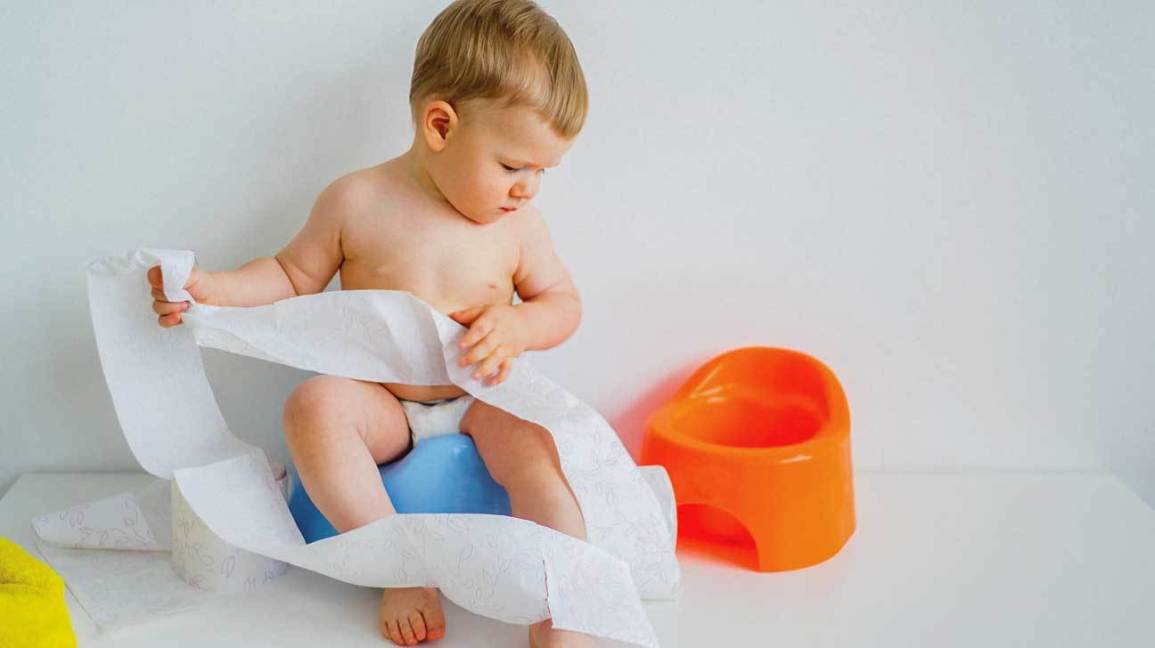Your toddler is getting ready to start school and you don’t want to send them in diapers or pull ups, so what do you do? Your best friend boasts that her little genius was diaper-free before his second birthday. Your nephew, on the other hand, refused to perch on the potty until preschool. Which is the right time frame for potty training? As with other developmental milestones, kids are programmed with one-of-a-kind schedules — and it’s crucial to let your child set the pace for when to start potty training.
What are the signals that your little person is ready for the potty?
- Fewer diaper changes. Children pee a lot, and up until the age of about 20 months, it’s nearly impossible to expect them to control their bladders. When your toddler stays dry for an hour or two at a stretch, or starts to wake up with a dry diaper, that is a sure sign that you can start to sit them on the potty.
- They tell you when they need to go or went potty. Some children happily announce when a bowel movement is about to strike, or they show signs they are getting ready to go by retreating to a corner or producing a preemptive grunt. No matter what the signal, if your child shows they are aware of their body’s functions, they are ready for potty training.
- Your child is able to perform simple undressing. When nature calls, the potty won’t be of much use unless your child can quickly yank down their pants or hike up their skirt and pull-ups or underwear.
Tips for starting potty training if your toddler is ready
- Pick some time to focus on potty training. Although there are several ways to potty train your child, one way is to take a weekend and focus on just your child and the potty. Dress them in easy to remove clothes and have the potty nearby to sit them on it often.
- Pick the right potty. Some toddlers prefer their own potty and others prefer a potty seat. Decide what’s best for your little one. If you buy a seat that attaches to the toilet, look for a stable fit — a shaky seat can spook a child back into diapers for weeks.
- Switch to pull-ups and take your child big kid underwear shopping. Pull-ups are a great in-between stage because they allow you to start training without the fear of an accident in a not-so-convenient place. Plus, they pull up like underpants but can still be ripped off rather than pulled to his feet. If your child has picked out their favorite underwear, they will want to wear it, and explain they can when they stay dry!
- Be patient. Potty training can be frustrating when you have to clean up a puddle on the bathroom floor or your toddler sits on the potty for hours and does nothing, but then stands up and pees. Be patient as your little one is learning. Provide gentle reminders throughout the day and take your little one to the bathroom periodically.
- Bring on the praise. When you have successes, remind him how proud you are and even provide treats, like a sticker for every successful pee and two for every poop. Even throw a small party for each time your child goes on the big potty.
- Hire an expert for extra support and help. Sometimes no matter what you have done or tried it’s time to bring on the experts! For instance, Motherhood Center offers Potty Training Consultation that is proven to help you move from diapers to big kid underpants! Whether you are about to start potty training, or you tried and gave up but want to start it up again, we can help.
Some toddlers pick up potty training almost immediately, and for some it takes a little longer. Your child isn’t developmentally behind if they aren’t ready to go on the potty, even if it’s time for them to start school. The preschool will generally help with potty training. Explain to the teacher that they aren’t ready, but you have been working on it.
It’s important to know that some kids start around age 2 and others are well into the 3’s. The process can take weeks or months, and nighttime potty training can take much longer. Most children should stay dry at night by the age of 5 and 7 years old. So be prepared with disposable nighttime training pants and mattress covers.
Potty training can be a frustrating developmental stage and it can be pretty messy. Try and be patient and don’t fret. Eventually your little one will learn the skill, and before you know it, you won’t have to lug around your diaper bag any longer.



